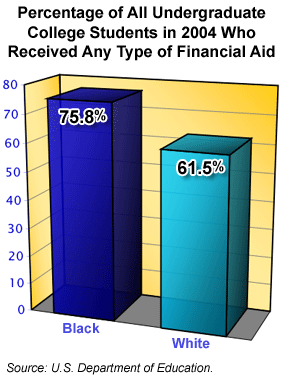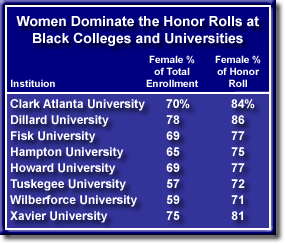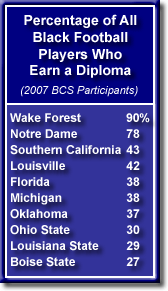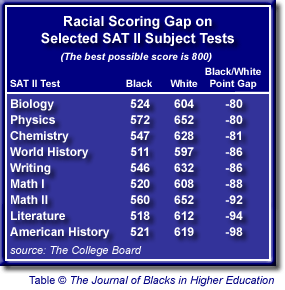Racial Differences in College Financial Aid Awards
New data from the U.S. Department of Education offers a comprehensive view of the financial aid situation for African-American college students across the nation. The data shows that in 2004, 75.8 percent of all African-American students enrolled in college received some type of financial aid. White students, too, are heavily dependent on financial aid. More than three out of every five white students enrolled in higher education, or 61.5 percent, receives some amount of financial assistance.
The federal data shows that 64.3 percent of all African-American students enrolled in college receive some level of scholarship grant or financial aid that does not have to be paid back. For whites, the figure is 47.8 percent.
In 2004, 43.1 percent of all black undergraduate students took out a student loan to help pay for their education. More than a third of white undergraduate students also took out loans to pay for college.

  |
“Hopefully I, as secretary of state, can still help the United States achieve some very important milestones. But when I’ve done that, I’ll go home to  California and teach students about this experience. I’m an academic at heart.” California and teach students about this experience. I’m an academic at heart.”
— Condoleezza Rice, telling a French television reporter that she had no desire to run for president in 2008, November 30, 2006
|
Ruth Simmons on List of Possible New Presidents of Harvard
 The Harvard Crimson reports that the university’s presidential search committee has submitted a list of 30 candidates to lead Harvard. Eleven of the 30 names were leaked to the student newspaper. Among the 11 names on the list that were revealed was Ruth Simmons, the president of Brown University. Simmons was the only African American among the 11 people named as candidates for the Harvard presidency. Formerly president of Smith College, Simmons is viewed as an extraordinarily strong and knowledgeable administrator. The Harvard Crimson reports that the university’s presidential search committee has submitted a list of 30 candidates to lead Harvard. Eleven of the 30 names were leaked to the student newspaper. Among the 11 names on the list that were revealed was Ruth Simmons, the president of Brown University. Simmons was the only African American among the 11 people named as candidates for the Harvard presidency. Formerly president of Smith College, Simmons is viewed as an extraordinarily strong and knowledgeable administrator.
The Harvard board of overseers is expected to name a new president this spring.
Women Students at Black Colleges Academically Outperform Their Male Peers
At many black colleges and universities women make up 60 percent or more of all enrollments. But the percentage of women students on the honor roll at these institutions is often higher than the female percentage of total enrollments.
JBHE surveyed eight black colleges and universities. At all eight, black women make up a larger percentage of students on the honor roll than their percentage in the student body. The most significant difference was found at Tuskegee University. There, black women make up 57 percent of the student body but 72 percent of the students on the honor roll. At Clark Atlanta, women make up 70 percent of the student body but they are 84 percent of students on the honor roll. At Wilberforce University in Ohio, women make up 59 percent of the student body but they are 71 percent of the students on the honor roll.
At Xavier University, which has a large number of students enrolled in premed programs, black women are 75 percent of the student body and 81 percent of the honor roll students. This is the smallest difference among the eight schools in our survey.

The Higher Education of the Nation’s Top African-American Restaurateur
Each week tens of thousands of diners eat at an Olive Garden or Red Lobster restaurant. Few of these diners know that the CEO heading these large restaurant chains is a black man.
 Clarence Otis Jr. is the CEO of Darden Restaurants Inc., the largest casual dining operator in the nation. The firm operates nearly 1,400 company-owned restaurants coast to coast serving 300 million meals annually. Darden employs 150,000 workers and has annual revenues of $6 billion. Clarence Otis Jr. is the CEO of Darden Restaurants Inc., the largest casual dining operator in the nation. The firm operates nearly 1,400 company-owned restaurants coast to coast serving 300 million meals annually. Darden employs 150,000 workers and has annual revenues of $6 billion.
Born in Vicksburg, Mississippi, Otis moved to Los Angeles when he was 6 years old. His father was a high school dropout who worked as a janitor. The family lived in Watts at the time of the 1965 riots. In the post-Watts period, Otis recalls being stopped and questioned by police several times a year because of the color of his skin.
A high school guidance counselor recommended him for a scholarship at Williams College, the highly selective liberal arts institution in Massachusetts. Otis graduated Phi Beta Kappa from Williams and went on to earn a law degree at Stanford.
Otis landed on Wall Street as a merger and acquisitions attorney for J.P. Morgan Securities. He joined Darden Restaurants in 1995 as corporate treasurer. He became CEO in 2004.

University of Wyoming

Educational Leadership (Assistant Professor)
Seeking a tenure-track faculty member to join a team that delivers masters and doctoral level educational leadership programs. Requirements for job consideration include having an earned PhD/EdD in Educational Leadership prior to appointment date, K-12 school/district administrative leadership experience, evidence of high-quality teaching ability, demonstrated potential to engage in a research and publication agenda. Preferences for the position include expertise in school district finance, policy, organization, equity, and board and community relations; higher education teaching experience; and experience and interest in distance teaching. College-wide duties/responsibilities include teaching, advising students, scholarly activity, and service. Specific department duties include involvement in professional organizations, service to state, commitment to a research and publication agenda, teaching through distance learning, communicating with students via e-mail; travel for teaching and intern supervision, and weekend teaching. Apply to Dr. Bill Berube, Department of Educational Leadership, (307) 766-5649, or edleader@uwyo.edu.
The University of Wyoming College of Education is strongly committed to attracting a diverse pool of faculty where cultural experiences and competencies are valued. More information is available at the College's website http://ed.uwyo.edu.
The University of Wyoming is an Affirmative Action, Equal Opportunity employer.

Middle Tennessee State University Students Seek to Rename Campus Building That Honors the Founder of the Ku Klux Klan
The Army’s ROTC recruitment center at Middle Tennessee State University in Murfreesboro is located in a building named after Confederate General Nathan Bedford Forrest. But some students at the Middle Tennessee State University want Forrest’s name removed from the building. More than 200 students have signed a petition calling for the building to be renamed. The students make the case that Forrest’s family was involved in the slave trade. And most important, Forrest is widely credited as being the founder of the Ku Klux Klan.
But other students on campus dispute the contention that Forrest was active in the Ku Klux Klan and consider the general a local hero. A counterpetition was circulated on campus defending Forrest.
 Forrest, a middle Tennessee native, joined the Army as a private at the beginning of the war but quickly moved up to the rank of general. Forrest is widely considered the most skilled cavalry officer in the Confederate Army. World War II German general Erwin Rommel is said to have been a student of Forrest’s battle tactics. Forrest, a middle Tennessee native, joined the Army as a private at the beginning of the war but quickly moved up to the rank of general. Forrest is widely considered the most skilled cavalry officer in the Confederate Army. World War II German general Erwin Rommel is said to have been a student of Forrest’s battle tactics.
The Tennessee Board of Regents will have the ultimate decision as to whether the name of the building is to be changed.
There are more than 20,000 undergraduate students at the university. About 12.3 percent of the student body is black. The fact that on a campus with over 2,400 black students only 200 students signed the petition calling for the name change — about 1 percent of the entire student body — suggests that at this time, there is not a great deal of support on campus for the effort to change the building’s name.
  |
2.6% Percentage of all non-Hispanic white females in the United States ages 15 to 19 who gave birth in 2005.
6.1% Percentage of all non-Hispanic black females in the United States ages 15 to 19 who gave birth in 2005.
source: National Center for Health Statistics
|
Northwestern University Professor’s Research Finds Middle-Class Blacks Face a Greater Risk of Downward Mobility Than Middle-Class Whites
 A study by Mary Pattillo, professor of sociology at Northwestern University, finds that blacks in the middle class are two and a half times as likely as middle-class whites to have a sibling in a lower socioeconomic bracket. Blacks in the middle class are also four times as likely as middle-class whites to have been poor earlier in life. A study by Mary Pattillo, professor of sociology at Northwestern University, finds that blacks in the middle class are two and a half times as likely as middle-class whites to have a sibling in a lower socioeconomic bracket. Blacks in the middle class are also four times as likely as middle-class whites to have been poor earlier in life.
The study, coauthored by Colleen Heflin of the University of Kentucky, is published in the December issue of the journal Social Science Research.
The significance of the data, according to Pattillo, is that life in the middle class is fragile for many African Americans. They often do not have other family members to help them out in times of need or emergency. In addition, they are much more likely than middle-class whites to have family members from a lower socioeconomic position ask them for financial assistance. Professor Pattillo says that the data explains why there is a higher risk of downward mobility for African Americans than is the case for whites.
Nigerian Professor at Alcorn State University Sentenced to Two Years in Prison for Inflicting Harsh Punishments on His Children
Festus Oguhebe, a professor of business at Alcorn State University, the historically black educational institution in Mississippi, has pleaded no contest to charges of child abuse. He has been sentenced to two years in state prison.
Professor Oguhebe was accused of abusing his children with harsh punishments for such offenses as not doing their homework or not observing religious fasts. Oguhebe was accused of whipping his children with extension cords, choking them, and forcing them to sleep outside in the yard. The most bizarre charge involved an allegation that Oguhebe placed his 11-year-old son in the bathtub with his hands bound behind his back. He then poured pepper juice on the boy's eyes, penis, and buttocks and then covered the youth with ants.
In his defense, Professor Oguhebe claimed that he was simply using forms of corporal punishment common in his native country of Nigeria.
A 2004 report by the Geneva-based World Organization Against Torture criticized child punishment practices in Nigeria. The report stated that “torture and ill treatment are inflicted on children in Nigeria on a dangerously large scale.” The report stated that common practices used as corporal punishment are flogging, stoning, whipping, and even amputation.
 Nation’s Top College Football Programs Have a Poor Record in Graduating Their Black Players Nation’s Top College Football Programs Have a Poor Record in Graduating Their Black Players
 Next month 10 universities will be sending their football teams to Bowl Championship Series (BCS) games which will net each participating school about $15 million in revenues. While these 10 universities are the cream of the crop of this year’s football teams, JBHE wondered how these teams rate in graduating their black football players. Next month 10 universities will be sending their football teams to Bowl Championship Series (BCS) games which will net each participating school about $15 million in revenues. While these 10 universities are the cream of the crop of this year’s football teams, JBHE wondered how these teams rate in graduating their black football players.
The overall answer is not very well with two notable exceptions. The graduation rate for black football players at Wake Forest University is a very high 90 percent. At the University of Notre Dame, 78 percent of all black football players earn their diplomas within six years of entering the university.
At the eight other universities sending teams to this year’s BCS games, the graduation rate for black football players is under 50 percent. This includes teams from such academically high-ranked institutions as the University of Michigan and the University of Southern California.
At both Boise State University and Louisiana State University, fewer than 30 percent of the black football players go on to earn a diploma.
Remember, too, that football players on all these teams are on athletic scholarships. So money is not a factor in their inability to earn a diploma.

Butler University

Assistant Professor Middle/Secondary Program
A tenure track position at the Assistant Professor level in the Middle/Secondary Program within the College of Education is available beginning August, 2007. Required qualifications include a doctorate in teacher education (ABD with completion date established is acceptable); and, three years of teaching experience in a middle/junior high/or high school setting. Preferred qualifications include a science background with an emphasis on inquiry; experience with a field-based teacher education program; a history of working collaboratively with colleagues; and, the ability to contribute in meaningful ways to the University’s continued commitment to cultural diversity, pluralism and individual differences.
Please send a letter of application, curriculum vitae, graduate transcripts, and three letters of reference and phone number to; Dr. Sam J. Guerriero, Search Committee Chair, Butler University, 4600 Sunset Avenue, Indianapolis, Indiana. Interview preferences will be given to those completed applications received on or before January 8, 2007. However, applications will continue to be accepted until the position is filled. Interviews will begin in February, 2007.
Butler University is an equal opportunity employer and is committed to enhancing the diversity of the student body and the faculty and staff. Therefore, women and minorities are strongly encouraged to apply.

|
The High-Ranking Colleges and Universities Where the Black Student Graduation Rate Is Better or Very Close to the Rate for White Students
 Nationwide the black student college graduation rate is 20 percentage points below the rate for whites. It may come as a surprise to many readers that there are a few selective colleges in the United States that report a higher graduation rate for blacks than for whites. Nationwide the black student college graduation rate is 20 percentage points below the rate for whites. It may come as a surprise to many readers that there are a few selective colleges in the United States that report a higher graduation rate for blacks than for whites.
Five of the nation’s top-ranked colleges and universities actually have a higher graduation rate for black students than for white students. According to the latest statistics from Mount Holyoke College, Pomona College, Smith College, Wellesley College, and Macalester College, a black student on these campuses is more likely to complete the four-year course of study and receive a diploma than is a white student.
JBHE has not been able to identify the reason for this anomaly at these five institutions, which is markedly inconsistent with nationwide statistics. But it is interesting to note that three of the five institutions are women’s colleges.
At some other highly selective institutions, the difference in black and white graduation rates is very small. Washington University in St. Louis has a 91 percent graduation rate for both blacks and whites. At Wake Forest University, Hamilton College, and Vanderbilt University, the white student graduation rate is only one percentage point higher than the rate for blacks. At Amherst College, Harvard University, Grinnell College, and Bryn Mawr College, the racial difference is only two percentage points.
Report Finds a Crisis in American Higher Education: Higher Fees and Less Financial Aid Result in Reduced Access for Blacks and Other Minorities
 A new study by the National Conference of State Legislatures concludes that public higher education is not doing an adequate job of preparing young Americans to be competitive in the twenty-first century economy. A new study by the National Conference of State Legislatures concludes that public higher education is not doing an adequate job of preparing young Americans to be competitive in the twenty-first century economy.
The report, entitled Transforming Higher Education: National Imperative — State Responsibility, warns “there is a higher education crisis in this country. The American system of higher education is no longer the best in the world.” One of the main problems, according to the report, is that higher education is becoming less accessible to the general population because of higher fees and lower availability of financial aid. This lower level of accessibility is especially damaging to blacks and other minorities, who are disproportionately from low-income families.
The authors of the report are six Republican and six Democratic state legislators. They allege that state legislatures are part of the problem by their not setting clear goals for higher education and not providing adequate funding.
Following are some recommendations from the report:
- Rethink funding strategies. Many states need to spend more on higher education, all states need to spend money more wisely.
- Balance merit-based and need-based aid. Help adults and part-time students afford college.
- Reduce the amount of debt students must incur to complete college.
- Make higher education more accessible with different locations, hours of operation, etc.
The full report can be downloaded by clicking here.

Eastern Washington University

College of Science, Health and Engineering
Department of Physical Therapy
The Department of Physical Therapy invites applications for a nine-month, full-time, tenure-track position beginning September, 2007. The position will be offered at the Assistant/Associate Professor level depending on qualifications. The Department of Physical Therapy offers the entry-level Doctor of Physical Therapy (DPT) and is located in a state-of-the-art Health Sciences Building located on the Spokane River in downtown Spokane. The city of Spokane, located in the Inland Northwest, has been rated 2nd in the nation for having the best summer weather. Recreational, social, and cultural opportunities are numerous.
Candidates must have a post professional doctoral degree (PhD or DSc), be eligible for licensure in the state of Washington, have a minimum of five years of clinical experience in Physical Therapy, teaching experience at the graduate level, and a high degree of interest in human and cultural diversity. Candidates will be expected to teach in their area of expertise, team teach in clinical research courses and contribute to other courses as needed. Research in the candidate’s area of interest and service to the department, university and profession are expected.
Candidates must submit a letter of application, current curriculum vitae, and names of three persons who can be contacted for references. Review of the candidates will begin immediately and will continue until the position is filled. The successful candidate will be required to pass a background check and show proof of eligibility to work in the US pursuant to US immigration laws.
Letter of application and curriculum vitas should be submitted to:
Byron Russell, PT, PhD
Chair, Department of Physical Therapy
Eastern Washington University
310 North Riverpoint Blvd, Box T
Spokane, WA 99202-0002
Tel: (509) 368-6608
E-mail: byron.russell@mail.ewu.edu
EWU is an Equal Opportunity/Affirmative Action Employer, and applications from members of historically underrepresented groups are especially encouraged.

Major Shortfalls in Ph.D. Awards in the Natural Sciences
 There continues to be a wide difference among blacks and whites in terms of the academic fields in which they earn doctorates. In 2005, 12 percent of doctorates awarded to whites were in the physical sciences. This is more than double the percentage for African Americans, which stood at 5 percent in 2005. One encouraging note is that the percentage of all black doctorates that were awarded in the natural sciences increased from 4.1 percent in 2004 to 5.0 percent in 2005. There continues to be a wide difference among blacks and whites in terms of the academic fields in which they earn doctorates. In 2005, 12 percent of doctorates awarded to whites were in the physical sciences. This is more than double the percentage for African Americans, which stood at 5 percent in 2005. One encouraging note is that the percentage of all black doctorates that were awarded in the natural sciences increased from 4.1 percent in 2004 to 5.0 percent in 2005.
The very large racial Ph.D. gap in the natural sciences is striking when we examine black Ph.D. awards in specific disciplines. For example, there were 72 doctorates awarded in 2005 in the field of astronomy. Not one went to an African American. African Americans earned only 16 doctorates in mathematics. This was only 1.3 percent of all doctorates awarded in the field.
A major weakness is that blacks earned 10, or about 0.7 percent, of the more than 1,300 doctorates in physics. In computer science, blacks won 1.3 percent of all Ph.D. awards. In chemistry, only 1.6 percent of Ph.D.s went to blacks. In the earth sciences such as geology, oceanography, and the atmospheric sciences, only two of the 379 doctorates awarded in the discipline went to blacks in 2005. In the ocean and marine sciences, only one of the 190 Ph.D.s in the discipline was awarded to an African American. In 2005, 142 African Americans were awarded a Ph.D. in the biological sciences. But they were only 2.2 percent of all doctorates awarded in the discipline.
New Online Resource for Graduate School-Bound African Americans
 A new online resource for black and other minority students who are considering graduate education has been established. GradPortal.org offers a wide variety of information on graduate programs, funding opportunities, and preparation for graduate school. In addition, the site includes Web blogs written by minority students which detail their experiences in graduate education, demonstrating that they are succeeding and how they cope with problems they encounter along the way. The bloggers post entries several times a week on a wide variety of topics that are of particular interest to minority students. A new online resource for black and other minority students who are considering graduate education has been established. GradPortal.org offers a wide variety of information on graduate programs, funding opportunities, and preparation for graduate school. In addition, the site includes Web blogs written by minority students which detail their experiences in graduate education, demonstrating that they are succeeding and how they cope with problems they encounter along the way. The bloggers post entries several times a week on a wide variety of topics that are of particular interest to minority students.
For a link to the GradPortal Web site, click here.
The Education Congressman Wants a New Job
 Congressman Chaka Fattah of Philadelphia, has represented Pennsylvania’s Second Congressional District for the past 12 years. In his 12 years on Capitol Hill, Fattah has championed education reform and established a wide range of programs to increase access to higher education for blacks and low-income students. Congressman Chaka Fattah of Philadelphia, has represented Pennsylvania’s Second Congressional District for the past 12 years. In his 12 years on Capitol Hill, Fattah has championed education reform and established a wide range of programs to increase access to higher education for blacks and low-income students.
Fattah is famed as the brainchild of the federal Gaining Early Awareness and Readiness for Undergraduate Programs (GEAR UP). Assisting millions of children, GEAR UP has become the largest pre-college awareness program in this nation’s history and has contributed nearly $2 billion toward the educational advancement of low-income students. Congressman Fattah also was instrumental in the creation of the CORE Philly Scholarship program which gives up to $3,000 to any high school graduate in the city who attends a state-operated university in Pennsylvania.
Fattah has now announced his candidacy for mayor of Philadelphia and has placed education reform at the top of his agenda should he be elected. This is extremely important for African Americans. There are currently more than 200,000 students enrolled in public and charter schools in the city. Nearly two thirds of all students in the city’s schools are black.
Duke University Elevates Black Studies to Departmental Status
 The Duke University board of trustees gave final approval granting departmental status to the university’s African and African-American Studies Program. In many ways the program had already operated as a department with 15 core faculty members. It already granted bachelor’s degrees in African-American studies. About 33 students at Duke are majoring in black studies this year. The Duke University board of trustees gave final approval granting departmental status to the university’s African and African-American Studies Program. In many ways the program had already operated as a department with 15 core faculty members. It already granted bachelor’s degrees in African-American studies. About 33 students at Duke are majoring in black studies this year.
Sarah Deutsch, dean of social sciences at Duke, said the upgrade was made because it “became clear that in circles outside of Duke the label ‘program’ carried connotations of impermanence. The shift to ‘department’ better represents Duke’s commitment to the enterprise.”
The new department also was encouraged to develop a Ph.D. program in black studies.

Temple University

Provost
Temple University invites inquiries, nominations and applications for the position of provost, the chief academic officer of the University.
Temple University is a comprehensive public research university and is an integral part of Pennsylvania’s Commonwealth System of Higher Education committed to a long tradition of access to excellence. Temple has one of the top 10 most ethnically diverse student bodies according to The Princeton Review’s The Best 361 Colleges. Diverse: Issues in Higher Education ranks Temple among the top 10 universities in the number of undergraduate, graduate, and professional degrees granted to African-Americans.
The successful candidate will have academic credentials and accomplishments that earn the respect of the academic community, and are commensurate with appointment at the rank of professor with tenure. The provost must have academic vision and leadership. As the University focuses on “access to excellence” for talented students, the provost will need the ability to develop strategic directions and to imagine new possibilities for the University. Other important attributes include successful management experience in a complex institutional environment that includes an academic medical center, the ability to recruit and retain an outstanding faculty, a collaborative management style, and a commitment to enhancing diversity in all areas of the University community.
Candidates should provide a cover letter, curriculum vitae and names and contact information of five references. Additional information about Temple University and the position can be found by clicking here; candidates are strongly encouraged to review the search documents posted there. The search will be conducted with respect for the confidentiality of candidates. Application materials can be sent by e-mail to the University’s consultants, Jean Dowdall, Ph.D., Mary Elizabeth Taylor and Oliver Tomlin at TempleProvost@wittkieffer.com; hard copy will be requested if it is needed. The consultants can be reached by phone at (212) 686-2676. Review of candidates will begin January 5. Compensation for this position is highly competitive.
Temple University is an equal opportunity and affirmative action employer committed to achieving excellence through diversity among its students, faculty, and staff.

The Large Racial Scoring Gap on Important SAT II Subject Tests
Last week JBHE reported that black students are far less likely than white students to take SAT II subject tests. These tests, given in 22 different subject areas, are usually required only by the nation’s most selective colleges and universities.
Of all the widely taken SAT II tests in 2006, the black-white racial scoring gap of 98 points, or approximately 15 percent, was the greatest on the American history test. There were also large racial gaps on both mathematics tests and both English tests. Racial gaps of 80 points or more also exist on the biology, physics, and chemistry tests.
The large racial gap on the English writing test, the most widely taken SAT II subject test and arguably the most important in the college admissions process, is of major concern.

President Bush Names Five to Panel on Black Colleges and Universities
 President Bush announced the appointment of five African Americans to serve on the President’s Board of Advisors on Historically Black Colleges and Universities. Four of the new appointees are presidents of black colleges. They are: Belinda Childress Anderson, president of Virginia Union University, Delbert W. Baker, president of Oakwood College, Ivory V. Nelson, president of Lincoln University of Pennsylvania, and Beverly Daniel Tatum, president of Spelman College. President Bush announced the appointment of five African Americans to serve on the President’s Board of Advisors on Historically Black Colleges and Universities. Four of the new appointees are presidents of black colleges. They are: Belinda Childress Anderson, president of Virginia Union University, Delbert W. Baker, president of Oakwood College, Ivory V. Nelson, president of Lincoln University of Pennsylvania, and Beverly Daniel Tatum, president of Spelman College.
Appointments
 • Theodosia Shields was appointed director of the James E. Shepard Memorial Library at North Carolina Central University in Durham. She has previously served as dean of library services at the University of Maryland Eastern Shore and as the university librarian at Dillard University in New Orleans. • Theodosia Shields was appointed director of the James E. Shepard Memorial Library at North Carolina Central University in Durham. She has previously served as dean of library services at the University of Maryland Eastern Shore and as the university librarian at Dillard University in New Orleans.
A native of North Myrtle Beach, South Carolina, Dr. Shields is a graduate of South Carolina State University. She holds a master’s degree from Atlanta University and a Ph.D. from the University of Pittsburgh.
 • James H. Ammons, chancellor of North Carolina Central University, was elected to the board of directors of the American Association of State Colleges and Universities. • James H. Ammons, chancellor of North Carolina Central University, was elected to the board of directors of the American Association of State Colleges and Universities.
 • Drew Berry has accepted an offer to join the faculty at the Scripps Howard School of Journalism and Communication at Hampton University. He was the general manager of WMAR-TV, the ABC television network affiliate in Baltimore. Berry is a graduate of the University of Texas at Austin. • Drew Berry has accepted an offer to join the faculty at the Scripps Howard School of Journalism and Communication at Hampton University. He was the general manager of WMAR-TV, the ABC television network affiliate in Baltimore. Berry is a graduate of the University of Texas at Austin.
Grants
 • Southern University, the historically black educational institution in Baton Rouge, Louisiana, will be participating in a $1.5 million grant from the National Science Foundation. Under the program, middle school teachers from Louisiana public schools will attend workshops at Southern University to learn how to better integrate information technology into their curricula. • Southern University, the historically black educational institution in Baton Rouge, Louisiana, will be participating in a $1.5 million grant from the National Science Foundation. Under the program, middle school teachers from Louisiana public schools will attend workshops at Southern University to learn how to better integrate information technology into their curricula.
• Philander Smith College, the historically black educational institution in Little Rock, Arkansas, received a five-year, $2.9 million grant for student recruitment and retention in the natural and physical sciences.
 • Tennessee State University, the historically black educational institution in Nashville, was awarded a $1 million grant from the U.S. Air Force’s Office of Scientific Research. The funds will be used to establish a nanoscience and biotechnology laboratory on campus. • Tennessee State University, the historically black educational institution in Nashville, was awarded a $1 million grant from the U.S. Air Force’s Office of Scientific Research. The funds will be used to establish a nanoscience and biotechnology laboratory on campus.
|
 .
.